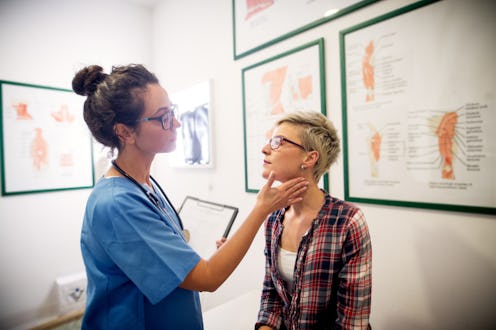Life
7 Fascinating Things It Means If You Get Car Sick As An Adult

Getting car sick can be inconvenient, embarrassing, and incredibly uncomfortable. But while this issue is commonly associated with childhood, it bothers many people even as they grow up. If you've been wondering what causes car sickness, you may be surprised at all the factors that could be causing your predisposition for motion sickness.
Car sickness is largely caused by your body being confused about how it's moving. "Put simply, car sickness is a [...] a byproduct of your head moving without your body actually exerting effort," Dr. Caesar Djavaherian, co-founder and chief medical director at Carbon Health, tells Bustle. That's why when you're driving you may feel just fine, but the second you have to sit in the back seat you begin to experience symptoms. Even putting in the motions of operating a car can keep your brain from experiencing this unpleasant sensation.
The specific feeling of car sickness is brought about when your body feels off balance. "Car sickness is a common issue where your sense of balance and equilibrium is thrown off by constant motion," health and wellness coach Caleb Backe, tells Bustle. "The central nervous system is in control of processing all sensory information and motion sickness effectively occurs when conflicting messages are sent to the central nervous system." And a myriad of factors — from small things like what medicine you take, to larger variables like your genetics — can cause you to be more or less susceptible to this.
Here are seven fascinating things it means if you get car sick as an adult, according to experts.
1You May Be Having Medication Side Effects
If car sickness has not been a constant struggle for you, it may be caused by the side effects of certain medications. Even non-prescription medicines can bring about motion sickness in adults.
"Some OTC medications, as well as prescriptions, can have motion sickness as a side effect," Backe says. "Since everyone reacts differently to medication this may or may not be the case for you. If you’ve recently started a new medication and are now experiencing car sickness consult with your doctor." If medications are the cause, your doctor may be able to find you a similar medicine that doesn't cause this unpleasant symptom.
2You Could Be More Susceptible Based On Your Sex
If you were assigned female at birth, studies have shown that may be connected to an increased likelihood of experiencing motion sickness as an adult.
"A recent summary of 23andMe data found that 55 percent of female research participants reported having experienced motion sickness compared to only 31 percent of male participants" Danielle Hayes, health product manager at 23andMe, tells Bustle. If your car sickness is predisposed, you may want to talk to your doctor about possible remedies.
3You Could Have Fluid In Your Ear
Car sickness, when brought about suddenly, is something to pay attention to. If you've been recently injured, it could be a sign of more serious inner ear issues.
"If you’ve recently hit your head or were involved in an accident and you now experience motion sickness, chances are that you have fluid in your ear or are experiencing another form of inner ear trouble," Backe says. If you suspect this, talk to your doctor as soon as possible.
4You Could Be Genetically Prone To Motion Sickness
According to a new 23andMe report, there are more than 413 genetic variants associated with motion sickness. So motion sickness may be something that you're hard-wired for.
Although this may be an unpleasant reality, it's not something to fret too much over. While it can be associated with other conditions, it's largely just an insight into how your body operates based on it's genetic makeup.
5You Could Be Prone To "Sensory Conflict"
The vestibular system, which controls parts of your inner ear and brain that help control balance and eye movements, is a key part of what can cause car sickness. So if you have particularly bad motion sickness, it could be caused by this system going awry.
"Most scientists think that motion sickness occurs due to 'sensory conflict' — when your vestibular system and muscles tell your brain that you're moving but your eyes send the opposite signal," Hayes says. "Those mixed signals cause some people to feel dizzy and nauseous. A vestibular system disorder can increase the occurrence of this sensory conflict." If you struggle a lot with these symptoms, it may be worth exploring more with your doctor.
6It Could Be Related To Your Ethnic Background
Like biological sex, ethnic background may play a role in whether or not you're predisposed to motion sickness, according to 23andMe research.
"There is evidence that motion sickness occurs more frequently in 23andMe research participants with Asian ancestry compared to those with European ancestry," Hayes says. If you notice your family shares a tendency towards car sickness, then it may be a genetic factor.
7You Could Have Another Co-Occurring Condition
While car sickness can sometimes exist on its own, research also shows that it tends to occur alongside some specific other medical conditions. You may be able to pinpoint your motion sickness in relation to these conditions if you notice symptoms of both.
"A third factor that may influence whether a person suffers from motion sickness is other medical conditions," Hayes says. "23andMe has published a study that found motion sickness to be associated with several other health conditions such as migraines, vertigo, and morning sickness. People who suffer from these mentioned conditions may have a heightened vulnerability to motion sickness." Still, if you're at all unclear about the cause of your symptoms, then it is always worth asking a doctor for more information.
Luckily, despite car sickness being incredibly unpleasant, there are a variety of remedies — from medication to home remedies like chewing ginger and doing acupressure on your wrist.